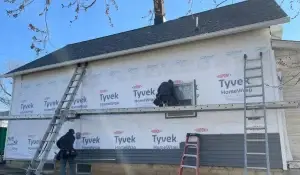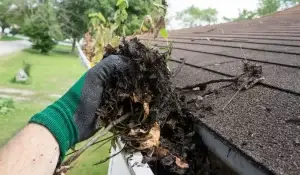Ask A Local Roofer For The Best Time To Replace Your Roof
When is the best time to replace your roof replaced? Before it starts to rain! When you need new roofing, hire skilled and friendly roofers to do the job. Finding a local Roofing Company near your area with experience is important. It will ensure the whole process goes as smoothly as possible. At DNS Exterior, we are proud to offer our customers excellent roofing services at prices they can afford. Call us at (815) 293-6311 and get a free estimate today!
10 Signs You Need To Replace Your Roof
It’s a question that often comes up, and if you’re looking for a new cover, you should ask it. Many people think their house cover needs a replacement every five years, which is not true. But many things can help you decide when to call in the experts. Some of these things are:
1. Age Of Your Roof
The age of your house cover is an important thing to think about when deciding if you need a new one or not. Most of it lasts between 15 and 25 years. It can vary on the materials used and how well they were put together if you’ve had leaks or mold in your home because of water damage. You likely need to replace it sooner rather than later.
2. The Weather In Your Area Matters
Suppose you live in a place with harsh weather like high winds, heavy rain, or a lot of snow. Your roof will take a beating and probably need a replacement sooner if you live where wildfires are common. You should pay extra attention to the condition of your house cover because it will be more likely to catch fire.
3. Type of Your Roof
How often you need to replace your house cover depends on what kind of house cover you have. For example, asphalt shingles usually only last around 20 years before they need a replacement. Metal roofs can last for 50 years or more. To determine how long your roof should last, hire the best metal roofing company near me to inspect it.
4. Size Of Your Roof
The larger your roof, the more it will cost to replace. But this doesn’t mean you shouldn’t replace your roof if it’s big. It’s even more important to do so if it’s not in good shape because a big top can do more damage to your home.
5. Your Budget
One of the most important things to think about when deciding whether to replace your house cover is how much money you have. Getting a new house cover is not a cheap project, so you’ll need to have enough money to pay for it. You might also want to look into paying for the replacement, such as a home equity loan.
6. Amount Of Sunlight It Receives
The sun’s ultraviolet (UV) rays break down the polymers in your shingles, making them less flexible and more brittle. It can cause cracks, curling, and other types of damage that can lead to leaks.8
7. Condition Of The Deck
If your deck is damaged, you need to fix it immediately. A damaged deck can let water in, damaging the inside of your house.
8. Lost Its Sealant
One of the most common signs is that getting a new house cover is time. If your home doesn’t have any sealant and water gets in. It means that there are holes and cracks in your roof materials. It makes it much more likely that your home will get water damage, which can cause mold to grow inside. It can also cause window and door frames to leak. It can let in bugs and rodents and rainwater when it storms or rains a lot.
9. Roof Shingles Are Curling Or Blistering
If the shingles on your roof are starting to curl up at the edges or you see blisters forming, this is another sign that you may need a new roof. These problems are mainly caused by moisture and can quickly leak if they aren’t fixed.
10. Energy Bills Have Gone Up
Suppose you’ve noticed that your energy bills have slowly gone up over time. It could mean that your roof is not shielding as well as it should. It means that warm and cool air is escaping from your house, causing your energy bills to go up. Getting rid of an old or damaged roof can help insulate your home and lower energy costs.
Why Is Summer The Best Time To Replace Your Roof?
- The labor cost is the lowest in the summer to get a better deal on your new roof.
- Most people take a break from school and work during the summer. It means that many contractors will be available to help you with your project, so they will do it faster than if you waited until fall or winter.
- Since summer is a slower time, you might find it easier to find a contractor who will work with you on price and schedule.
- The weather is better during the summer, so there is less chance that your project will be delayed because of bad weather.
- Most businesses are slower in the summer, so you might be able to get discounts on materials and other costs for your project.
If you want to get a new roof, the best time is in the summer. You save money on labor and supplies, and the weather is better. If you keep these things in mind when making your decision, you’ll be able to replace your roof at the best time.
How Often Should A Roof Be Replaced?
The lifespan of your roof depends on the type of roofing material you have, the climate you live in, and how well you maintain it. The average lifespan of an asphalt shingle roof is 20-25 years, while a metal roof can last up to 50 years. If you have a tile roof, it could last up to 100 years. However, these are just averages, and your roof’s lifespan could be shorter or longer depending on the factors mentioned earlier.
Suppose you have a professional roof company to look at your roof every 3–5 years. In that case, they can find problems early, and you can avoid major damage. Check your roof for damaged or missing shingles after a bad storm to stop leaks.
Reasons To Replace Your Roof
Changing the roof is one of the most common ways to improve a house. It can also be one of the most satisfying jobs. Roofing made of asphalt shingles usually lasts between 20 and 30 years before it needs a replacement. If your roof is old and worn, you might want to think about getting a new one from the roof replacement company. Here are some excellent reasons to get a new roof:
It’s Cheaper Than Fixing It
Cost is the main reason people decide to replace their roofs instead of fixing them. A leaking roof needs to be fixed by a professional. It can be expensive depending on how long it takes and the materials used. Also, you should replace your roof instead of trying to fix it if it’s old and worn out or if it’s been damaged by an accident or a storm.
You’ll Save Money On Utilities
Your house will stay cooler in the summer if you get a new roof. Shingles made of asphalt that has been rubberized and fiberglass are called asphalt shingles. Instead of letting it in, they send the sun’s heat away from your house. So you can save money on air conditioning during the summer. A new roof will also help protect your home from the cold and keep heat from escaping, saving you money on heating costs.
It’s Good For The Environment
When you replace your roof, you are also helping the environment. Most roofing materials, like asphalt shingles, are made from things already used. Also, a lot of roofing companies have ways to recycle old roofs. By replacing your roof, you’ll help cut down on waste, but you’ll also help recycle materials that you can use to make new roofs.
Your Home Will Be More Valuable
Replacing your roof also increases the value of your home. A well-maintained home is less likely to need major repairs in the future. If you plan to sell your house soon, a new roof will add value and appeal to potential buyers.
Your Home Will Be Safer
Your roof may not be able to protect your home from the elements if it is old or damaged. It can cause water damage and mold growth in your home. An old or damaged roof is also more likely to collapse during a storm, putting you and your family in danger. If you replace your roof, it will better protect your home from the elements.
Now that you know some of the benefits of replacing your roof, you might be wondering when is the best time to do it. The answer depends on a few things, like how old and good your current roof is, the weather where you live, and how much money you have.
Contact DNS Exterior, a local roofer who has been in business for over 20 years. We can fix shingles that have been damaged by the weather, leaks, or other problems. Give us a call if you need a new roof, roof repairs, or roof maintenance. Let us look at your situation, and we will tell you the best Local Roofing Services to get your roof back on track. Get a free estimate. Call us at (815) 293-6311 today!
We Offer The Services As Follows:
Articles We’ve Hand Picked For You:
- 5 Things You Should Know Before Replacing Your Roof
- Should I Replace My Roof? (Here Are 23 Things To Consider)
- The Benefits of Gutter Replacement
Frequently Asked Questions
What is the ideal temperature for a roof replacement?
According to Roofing Construction & Estimating by Daniel Benn Atcheson, the best temperatures for installing asphalt shingles are between 40 and 85 degrees F (4 and 26 degrees C). If you install roofing shingles in cold weather, your shingles may become brittle and more prone to breakage.
When should you replace your roof?
In general, based on the material used, the following is the recommended replacement schedule: Shingles composition: 12-20 years. 15-30 years for asphalt shingles. 20-25 years for wood shingles. Rubber roofing lasts 30–50 years. Metal roofs last 50-75 years.
When should a roof not be installed?
Roofs cannot be installed in temperatures below 30 degrees Fahrenheit. Most roofing companies will tell you that they do not install roofs in temperatures below 40 degrees. This is due to the fact that asphalt shingles tend to crack below that temperature.
How often should I have my roof replaced?
If your roof was properly installed, your attic is adequately ventilated, and you maintain it, it will have the longest possible lifespan. This means you shouldn’t need to replace your roof for at least 20 years, and possibly up to 50 years (or longer), depending on the type of roofing material you have.
Is it a bad idea to replace a roof in the winter?
It is entirely possible to complete a successful roof replacement during the winter months. In fact, if you discover a significant leak or roof damage during the winter, we recommend replacing your roof as soon as possible to reduce the risk of further damage.
Is it bad to install a roof in winter?
Yes, asphalt shingles can still be installed successfully in cold weather, providing a few important changes are made to the usual practices. If the temperature dips below freezing, frost, ice, and snow become a serious safety factor on the roof.







